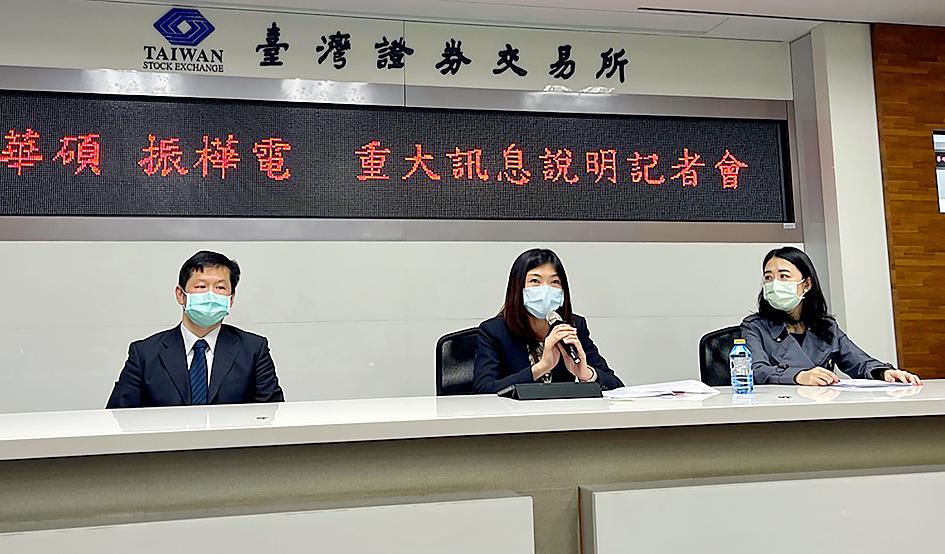Asustek Computer Inc (華碩電腦) yesterday announced plans to form a strategic alliance with Portwell Inc (瑞傳科技) to jointly build an embedded foundry to accelerate its development in the artificial intelligence of things (AIoT) industry and advancement of related applications.
Under the partnership, Asustek is to purchase a 30 percent stake in industrial PC maker Portwell for NT$1.5 billion (US$52.85 million), it told a news conference at the Taiwan Stock Exchange.
Asustek said the deal would close by the end of this quarter, and it might purchase another 15 percent of Portwell shares after a year.

Photo: CNA
That would raise its stake to 45 percent, as the two sides aim to deepen their cooperation as well as help Portwell return to the capital market, it said.
Portwell is a wholly owned subsidiary of Posiflex Technology Inc (振樺電子), a point-of-sale terminal brand that acquired Portwell in July 2017 for NT$4.6 billion.
It produces and designs industrial computers, embedded computing solutions, as well as mobility and barcoding accessories specializing in customized solutions.
The company has research and development (R&D) and manufacturing facilities in Taiwan and the US, and assembly lines in the Netherlands and Japan.
“Using Portwell’s embedded foundry and connections to key customers as foundations, Asustek will leverage this strategic alliance to integrate design, R&D and manufacturing needs in the industry and offer rapid, highly flexible, customized, high-quality and cost-competitive solutions,” Asustek said in a statement.
Portwell’s revenue was about NT$6 billion last year, Posiflex spokeswoman Rita Hsu (徐瑞妤) said, adding that its revenue grew by double-digit percentages from 2017 to 2019, and operating margin was more than 10 percent.
Asustek said it plans to nominate senior vice president Jackie Hsu (許佑嘉) and corporate vice president Albert Chang (張權德) to sit on the board of Portwell. The two are coheads of Asustek’s AIoT business group.
“They will participate in operations management, and cooperate with Portwell’s operations team and the Posiflex global corporate office to rigorously develop the AIoT business,” Asustek said in the statement.
The AIoT business group was formed in late 2019.
In 2018, Asustek chairman Jonney Shih (施崇棠) promised to make AIoT the core business of the company and boasted of preparing a NT$10 billion war chest to achieve this goal, the Chinese-language Business Next reported on its Web site.

GROWING OWINGS: While Luxembourg and China swapped the top three spots, the US continued to be the largest exposure for Taiwan for the 41st consecutive quarter The US remained the largest debtor nation to Taiwan’s banking sector for the 41st consecutive quarter at the end of September, after local banks’ exposure to the US market rose more than 2 percent from three months earlier, the central bank said. Exposure to the US increased to US$198.896 billion, up US$4.026 billion, or 2.07 percent, from US$194.87 billion in the previous quarter, data released by the central bank showed on Friday. Of the increase, about US$1.4 billion came from banks’ investments in securitized products and interbank loans in the US, while another US$2.6 billion stemmed from trust assets, including mutual funds,

AI TALENT: No financial details were released about the deal, in which top Groq executives, including its CEO, would join Nvidia to help advance the technology Nvidia Corp has agreed to a licensing deal with artificial intelligence (AI) start-up Groq, furthering its investments in companies connected to the AI boom and gaining the right to add a new type of technology to its products. The world’s largest publicly traded company has paid for the right to use Groq’s technology and is to integrate its chip design into future products. Some of the start-up’s executives are leaving to join Nvidia to help with that effort, the companies said. Groq would continue as an independent company with a new chief executive, it said on Wednesday in a post on its Web

JOINT EFFORTS: MediaTek would partner with Denso to develop custom chips to support the car-part specialist company’s driver-assist systems in an expanding market MediaTek Inc (聯發科), the world’s largest mobile phone chip designer, yesterday said it is working closely with Japan’s Denso Corp to build a custom automotive system-on-chip (SoC) solution tailored for advanced driver-assistance systems and cockpit systems, adding another customer to its new application-specific IC (ASIC) business. This effort merges Denso’s automotive-grade safety expertise and deep vehicle integration with MediaTek’s technologies cultivated through the development of Media- Tek’s Dimensity AX, leveraging efficient, high-performance SoCs and artificial intelligence (AI) capabilities to offer a scalable, production-ready platform for next-generation driver assistance, the company said in a statement yesterday. “Through this collaboration, we are bringing two

Even as the US is embarked on a bitter rivalry with China over the deployment of artificial intelligence (AI), Chinese technology is quietly making inroads into the US market. Despite considerable geopolitical tensions, Chinese open-source AI models are winning over a growing number of programmers and companies in the US. These are different from the closed generative AI models that have become household names — ChatGPT-maker OpenAI or Google’s Gemini — whose inner workings are fiercely protected. In contrast, “open” models offered by many Chinese rivals, from Alibaba (阿里巴巴) to DeepSeek (深度求索), allow programmers to customize parts of the software to suit their